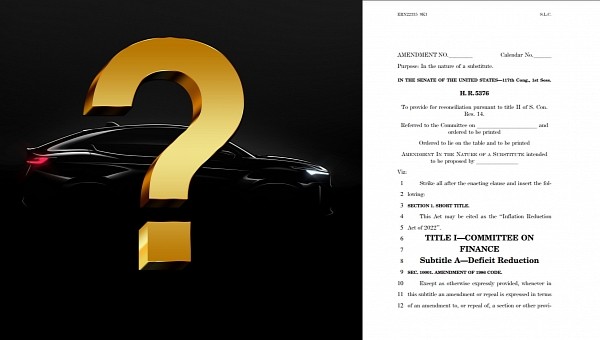Most EV advocates are happy that the Inflation Reduction Act (IRA) brought back the federal tax credit to all car companies (including Tesla). However, senator Joe Manchin is not happy with how people and even the U.S. government are dealing with the new law. That’s why he reinforced something that should be obvious by now, but some still fail to grasp: the IRA is not about EV credits: it is an energy-security bill.
Just think about it: the only vehicles that will deserve the $7,500 federal tax credit are those that meet some requirements regarding prices and the sourcing of batteries, EV components, and raw materials, which are meant to reduce dependency on the countries that currently produce them, namely China. These criteria will get increasingly more stringent until 2028. Let’s remember the rules, shall we?
Eligible electric passenger vehicles have to cost up to $55,000, and SUVs, pickup trucks, or vans cannot have a higher price tag than $80,000. Until the end of 2023, they also need 40% of their raw materials processed, extracted, or recycled in North America or countries with which the U.S. has a free trade agreement deal. That gives them half of the incentives, or $3,750. The other half comes to those that have 50% of battery components manufactured or assembled in North America, also until 2023 ends.
In 2024, the percentage requirement of raw materials under the IRA rules has to increase to 50%, and the minimum percentage of battery components must reach 60%. As you may have noticed, there are 10% increments in the requisites every year. In 2025, that’s respectively 60% and 70%. In 2026, 70% and 80%, and 80% and 90% in 2027, when the raw material percentage increases stop. Battery component percentage requirements keep going up until 2028 when they reach 100%.
That should be the rule starting on January 1, but that is not what is happening. According to Manchin, the U.S. Department of the Treasury “has failed to issue updated guidance for the 30D electric vehicle tax credits and continues to make the full $7,500 credits available without meeting all of the clear requirements included in the Inflation Reduction Act.” The senator said this is unacceptable, hence introducing the American Vehicle Security Act (AVSA). This regulation wants to force the DoT to do what it should have done until December 31.
That raises several crucial questions. If the DoT should have provided these guidelines until the end of 2022 and didn’t, isn’t there any other instrument to force it to do so apart from a new bill? If the guidelines aren’t in place, how can the federal tax credit work without one of its most essential prerequisites? Finally, who will certify that the eligible vehicles comply with the content requirements?
Without a robust system to make sure that EVs follow the IRA guidelines, chances are that raw materials and battery components will keep coming from China, which is precisely what Manchin wanted to avoid when he helped write and approve the bill. In his words, “it is shameful that we rely so heavily on foreign suppliers, particularly China, for the batteries that power our electric vehicles. We cannot continue down this path.” Ironically, approving the IRA seems to have been just the first step to prevent that. We wonder how many more will follow and how effective they will prove to be.
Eligible electric passenger vehicles have to cost up to $55,000, and SUVs, pickup trucks, or vans cannot have a higher price tag than $80,000. Until the end of 2023, they also need 40% of their raw materials processed, extracted, or recycled in North America or countries with which the U.S. has a free trade agreement deal. That gives them half of the incentives, or $3,750. The other half comes to those that have 50% of battery components manufactured or assembled in North America, also until 2023 ends.
In 2024, the percentage requirement of raw materials under the IRA rules has to increase to 50%, and the minimum percentage of battery components must reach 60%. As you may have noticed, there are 10% increments in the requisites every year. In 2025, that’s respectively 60% and 70%. In 2026, 70% and 80%, and 80% and 90% in 2027, when the raw material percentage increases stop. Battery component percentage requirements keep going up until 2028 when they reach 100%.
That should be the rule starting on January 1, but that is not what is happening. According to Manchin, the U.S. Department of the Treasury “has failed to issue updated guidance for the 30D electric vehicle tax credits and continues to make the full $7,500 credits available without meeting all of the clear requirements included in the Inflation Reduction Act.” The senator said this is unacceptable, hence introducing the American Vehicle Security Act (AVSA). This regulation wants to force the DoT to do what it should have done until December 31.
That raises several crucial questions. If the DoT should have provided these guidelines until the end of 2022 and didn’t, isn’t there any other instrument to force it to do so apart from a new bill? If the guidelines aren’t in place, how can the federal tax credit work without one of its most essential prerequisites? Finally, who will certify that the eligible vehicles comply with the content requirements?
Without a robust system to make sure that EVs follow the IRA guidelines, chances are that raw materials and battery components will keep coming from China, which is precisely what Manchin wanted to avoid when he helped write and approve the bill. In his words, “it is shameful that we rely so heavily on foreign suppliers, particularly China, for the batteries that power our electric vehicles. We cannot continue down this path.” Ironically, approving the IRA seems to have been just the first step to prevent that. We wonder how many more will follow and how effective they will prove to be.




















